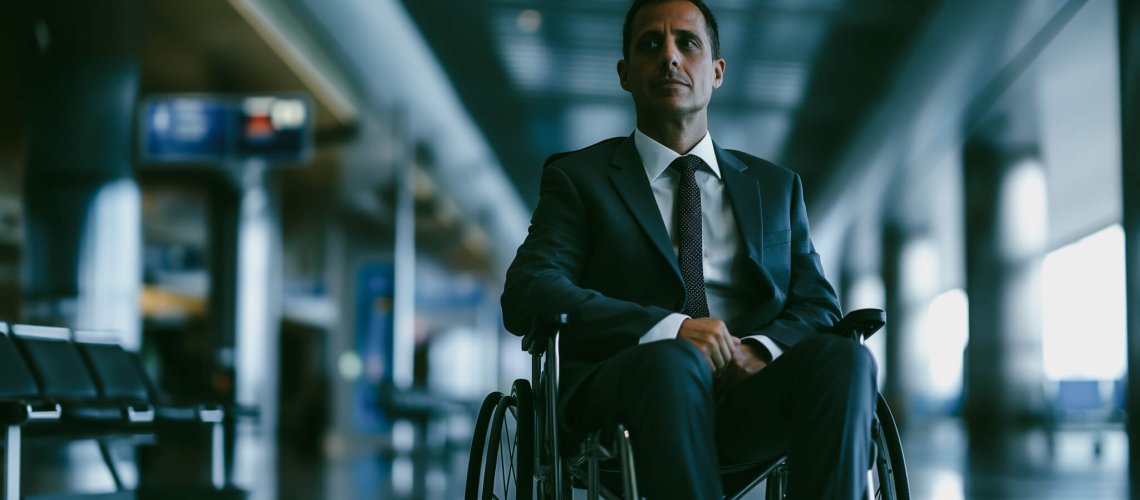Advancements in accessibility and an increasing focus on inclusivity are helping businesses future-proof their success. Whilst also positively impacting employee satisfaction, recruitment and growth. With business travel an essential part of modern day operations, companies are building travel programmes, and seeking suppliers, who are adopting more inclusive outlooks.
In a recent documentary, Sophie Morgan’s Fight to Fly, we see first-hand that the reality of travel remains a real challenge for those with disabilities;
“No one who has used a wheelchair in public needs to be convinced that transport, especially air, is often shamefully inaccessible. But Morgan knows she doesn’t have the luxury of preaching to the converted. To create change, first she has to convince non-disabled decision-makers that this matters.”1
In this blog post, we’ll explore accessibility options for business travellers, including practical tips and services that ensure smoother, more comfortable, and dignified experiences.
1. Booking Accessible Travel
When planning a business trip, ensuring that your mode of transportation and accommodation cater to accessibility needs is crucial. Here are a few points to consider when booking:
Air travel: Accessibility features
- Priority boarding: Most airlines provide priority boarding for passengers with mobility issues, allowing extra time to board and settle
- Wheelchair assistance: Almost all airports provide wheelchair assistance, but it is important to request this service at least 48 hours in advance
- In-flight accessibility: Some airlines offer onboard accessibility features such as aisle chairs, accessible lavatories, and dedicated seating for passengers with disabilities. Research which airlines prioritise these features
Train & bus accessibility
For short-haul business trips, trains and buses are viable alternatives to flying. Most train services and many bus companies provide accessible seating, bathrooms, and assistance at stations. However, not all routes or vehicles are equally accessible, so confirming ahead of time is essential.
Booking an accessible hotel
Accommodation is a major consideration for any traveller, but for those with disabilities, it’s particularly important. Some tips for booking accessible hotels include:
- Check for ADA compliance: If you’re travelling in the U.S., ensure that the hotel is compliant with the Americans with Disabilities Act (ADA). Similarly, look for equivalent certifications in other countries
- Request specific features: If you need features like roll-in showers, handrails, or visual alarms, ask for detailed descriptions or photos of the room
- Location of the room: Request a room close to elevators or the lobby to minimise long walks
2. Ground Transportation Solutions
Navigating a new city can be daunting, especially when local infrastructure is not always designed with accessibility in mind. Luckily, there are several transportation solutions for business travellers with disabilities:
Accessible car rentals
Major car rental companies offer accessible vehicles with features like hand controls and wheelchair lifts. When renting a car for business, be sure to reserve an accessible vehicle well in advance, as availability can be limited.
Ride-Sharing services
Popular ride-sharing providers and apps offer options for wheelchair-accessible vehicles (WAV) in some cities. These services allow you to book a ride from your phone and track your driver’s arrival. While not available everywhere, it’s worth checking if WAV services are operational in your destination.
Public transport options
Many cities have public transportation systems that are increasingly accommodating to people with disabilities. This may include elevators in subway stations, low-floor buses, or specialised transportation services for those with mobility challenges. Before your trip, research the accessibility of the local public transport network to ensure it meets your needs.
3. Digital tools for accessibility
For business travellers with disabilities, digital tools can make a significant difference in ensuring a smooth experience. Here are a few technologies to consider:
Travel apps with accessibility features
- Google maps: Google maps has an “Accessible Places” feature that highlights wheelchair-accessible entrances, seating, restrooms, and parking spots in various locations
- Be My Eyes2: This app connects visually impaired users with volunteers who can assist them via video call with everyday tasks, such as navigating new surroundings
- Wheelmap3: This app allows users to find and review accessible places worldwide, including restaurants, hotels, and conference centres
Assistive devices & gadgets
- Portable ramps: If you’re attending meetings in older buildings that may not have wheelchair access, a portable ramp can be a lifesaver
- Noise-cancelling headphones: For those with sensory sensitivities, noise-cancelling headphones can provide relief in busy, overwhelming environments like airports and conference centres
- Speech-to-text devices: For those with hearing impairments, devices like live transcription apps or hearing aids with Bluetooth connectivity can help with communication during meetings and events

4. Navigating business conferences & events
Business conferences are an important part of networking and professional development. However, accessibility at large-scale events can be inconsistent. Here’s how you can ensure a more inclusive experience:
Research venue accessibility
Before attending a conference, research the venue’s accessibility features, such as ramps, elevators, accessible restrooms, and seating arrangements. Contact the event organisers to ensure that accommodations, such as sign language interpreters or assistive listening devices, are available if needed.
Use virtual meeting platforms
The rise of virtual meetings has created opportunities for greater accessibility in business events. Platforms like Zoom and Microsoft Teams offer features like live captions, screen readers, and high-contrast displays, allowing attendees with disabilities to participate fully from wherever they are.
5. Inclusive Business Practices for Employers
For businesses, ensuring that travel policies are inclusive is not just a matter of compliance, but also one of creating a positive work environment. Here are some ways employers can support business travellers with disabilities:
- Flexible travel arrangements: Allow employees to choose the transportation and accommodation options that best meet their needs
- Provide accessible technology: Ensure that your employees have the right tools, such as accessible mobile apps or assistive devices, to make travel easier
- Pre-arranged support services: Employers can arrange for ground transportation, mobility aids, or personal assistance to meet employees upon arrival at their destination
Conclusion: Towards an Accessible Future for Business Travel
While business travel can present unique challenges for people with disabilities, growing awareness and innovations in accessibility are having a positive impact. By planning ahead, utilising digital tools, and taking advantage of the accessibility features offered by airlines, hotels, and ground transportation, business travellers with disabilities can enjoy smooth, stress-free trips.
Employers also play a critical role in ensuring that travel policies and support systems are inclusive, creating a more equitable and comfortable experience for all business travellers. With continued focus on accessibility, we move closer to a future where everyone, regardless of ability, can fully participate in the global business landscape.
MIDAS Travel works with clients to build tailormade business travel programmes. We use traveller profiles to ensure personalised traveller experiences and that all needs are met and exceeded for all. To review your corporate travel programme, then get in touch.
USEFUL LINKS
- Traveller profiles help make the most of business travel programmes – MIDAS Travel Blog
- Are you a business traveller? – MIDAS Travel Website
- How Virgin Atlantic is helping people with hidden disabilities overcome travel challenges – Virgin Atlantic Website
Footnotes
- Sophie Morgan’s Fight To Fly, August 2024, Channel 4 ↩︎
- Be my eyes, mobile app ↩︎
- Wheelmap is a map for wheelchair accessible places, Wheelmap ↩︎

